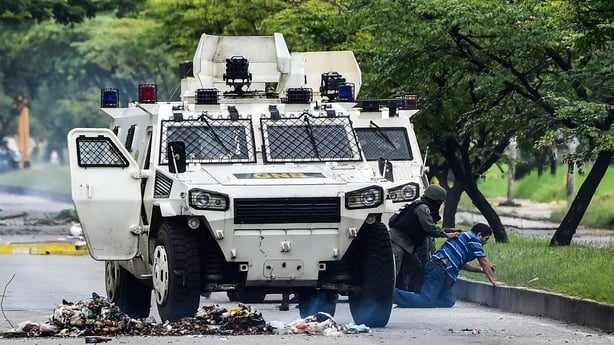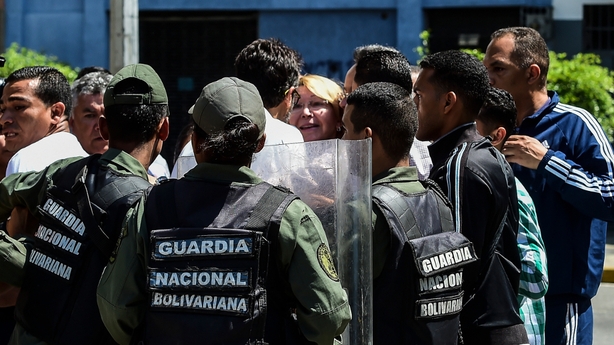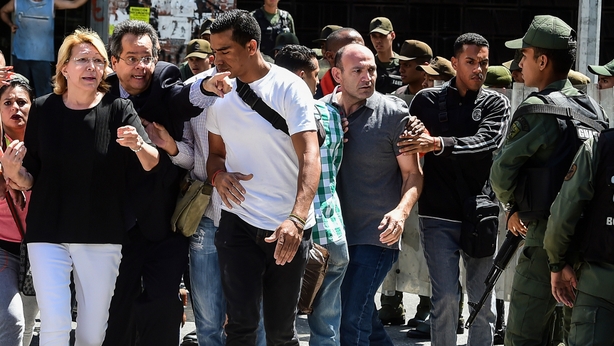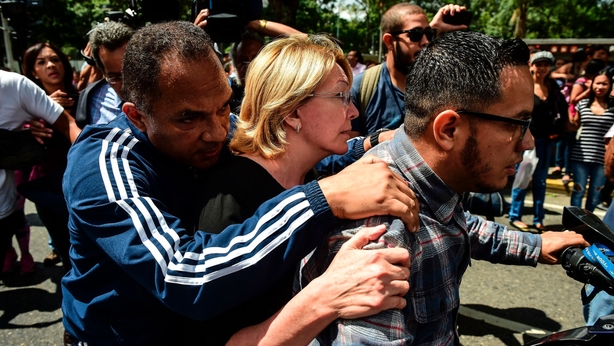Venezuelan authorities suppressed a small rebellion at a military base near the city of Valencia today, arresting seven men who they say participated in a "terrorist attack" against the government of unpopular President Nicolas Maduro.
Two assailants were killed and eight captured in the attack, Mr Maduro said on state television.
Earlier today a video circulated on social media showing a group of men in military uniform announcing an uprising in the wake of the creation of a pro-government legislative superbody on Friday, which was widely condemned as a power grab.
Some of the alleged plotters got away with weapons stolen from the base, and state security forces were "intensely" searching for them, the defense ministry said in a statement.
Mr Maduro, in a televised address, congratulated the armed services for beating back what he called a "terrorist attack".

Hundreds took to the streets in Valencia to support the uprising, said resident Carolina Herrera, who like other witnesses reported shots through the night.
But hooded protesters had been largely dispelled with teargas by midday today, and the rest of the South American country of 30 million appeared to be calm.
Still, the episode highlights how volatile Venezuela is after four months of sustained anti-government protests over what the opposition calls the country's slide into a dictatorship.
Last week Venezuela elected a 545-member legislative superbody that Mr Maduro calls Venezuela's only hope for restoring peace.
The opposition calls it a naked power grab aimed at keeping the president in office despite low approval ratings.
Maduro ally appointed as Venezuela's new attorney general
Venezuela's new assembly has replaced the country's attorney general with Mr Maduro's human rights ombudsman, Tarek Saab, a government ally who the opposition says has turned a blind eye to state abuses.
Yesterday, the assembly fired Luisa Ortega and ordered her to stand trial in its first session, confirming opposition fears that it would use its powers to root out critics of the president.
After taking his oath, Mr Saab vowed to stop violence against security forces and Maduro loyalists.
He criticised Ms Ortega for what he called her "complicity and inaction" in the face of the bloodshed that has occurred in recent months.
Ms Ortega had become Mr Maduro's main challenger from within the ruling socialist movement since the start of opposition street protests in April, which have left more than 120 people dead as rock-throwing protesters were met by state security forces firing rubber bullets and water cannon.
She accused him of human rights abuses and of fudging the results of last weekend's election of the new 545-member constituent assembly.


The new legislative body has no checks on its powers, and critics say the decision to remove Ms Ortega is an ominous sign of a move by Mr Maduro into full-blown dictatorship.
Critics blame his state-centric policies for pushing Venezuela into an economic crisis marked by triple digit inflation and severe shortages of food and medicine.
The assembly will function for up to two years, according to a resolution it passed yesterday.
The body's stated goal is to lock in the policies of late President Hugo Chavez, who put Venezuela on its socialist path when he was first elected nearly two decades ago.
It will hold its sessions in the same legislative complex as the traditional congress, which could potentially be dissolved.
For now, the two bodies are set to hold sessions in parallel, separated by an ornate cobblestone courtyard.
The opposition, in control of the country's traditional congress, boycotted last Sunday's vote, meaning that all candidates for the new body were Maduro allies.
His loyalist Supreme Court sent a letter to the assembly announcing its indictment of Ms Ortega, accusing her of "alleged commission of serious misconduct," without providing details.
Her office was blocked by armed National Guardsmen and she said she was roughed up as she tried to enter the building, claiming that one guardsman hit her with his body shield.
Ms Ortega ended up fleeing the chaos on a motor bike.

A half block away a colourful street mural was painted on a wall saying "The Constituent Assembly Will Go Forward".
"The firing of Chief Prosecutor Luisa Ortega is the first dictatorial act of an illegitimate constituent assembly. We reiterate our solidarity with the Venezuelan people," Juan Manuel Santos, president of neighbouring Colombia, tweeted.
Chile's leader Michelle Bachelet called Ms Ortega's firing another step in Venezuela's "democratic breakdown".
Washington singled out Mr Maduro for financial sanctions last week and Pope Francis urged him not to inaugurate the divisive new body.
South American trade bloc Mercosur indefinitely suspended Venezuela, adding to international pressure on Mr Maduro to dismantle the newly created assembly and restore democracy.
The assembly passed a resolution "emphatically rejecting" Mercosur's action.
Authorities yesterday returned opposition leader Leopoldo Lopez to his home, his wife tweeted, where he is serving house arrest for his role in leading anti-government protests in 2014.
He had been taken to a military prison on Tuesday after having been granted house arrest in July.

